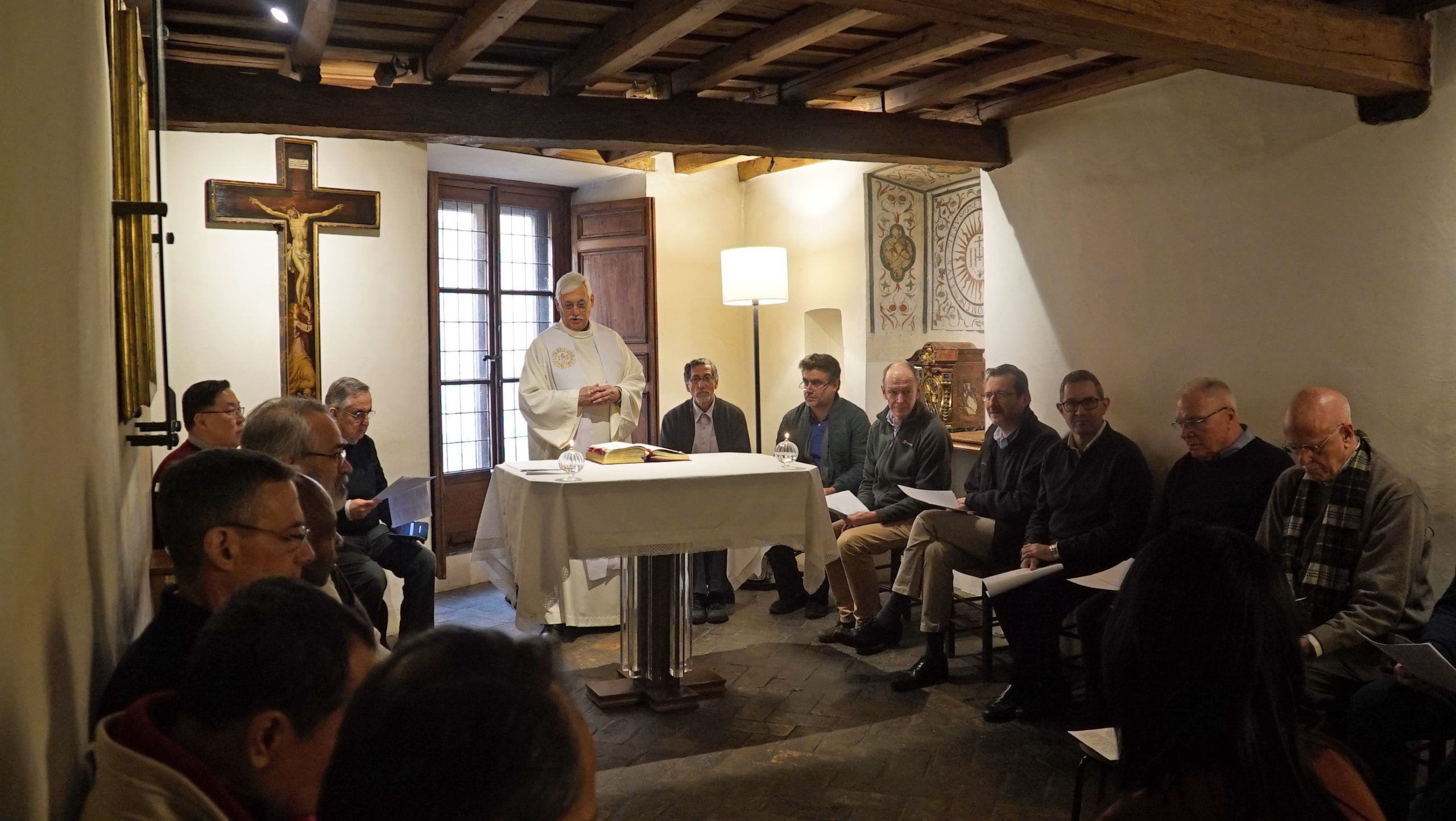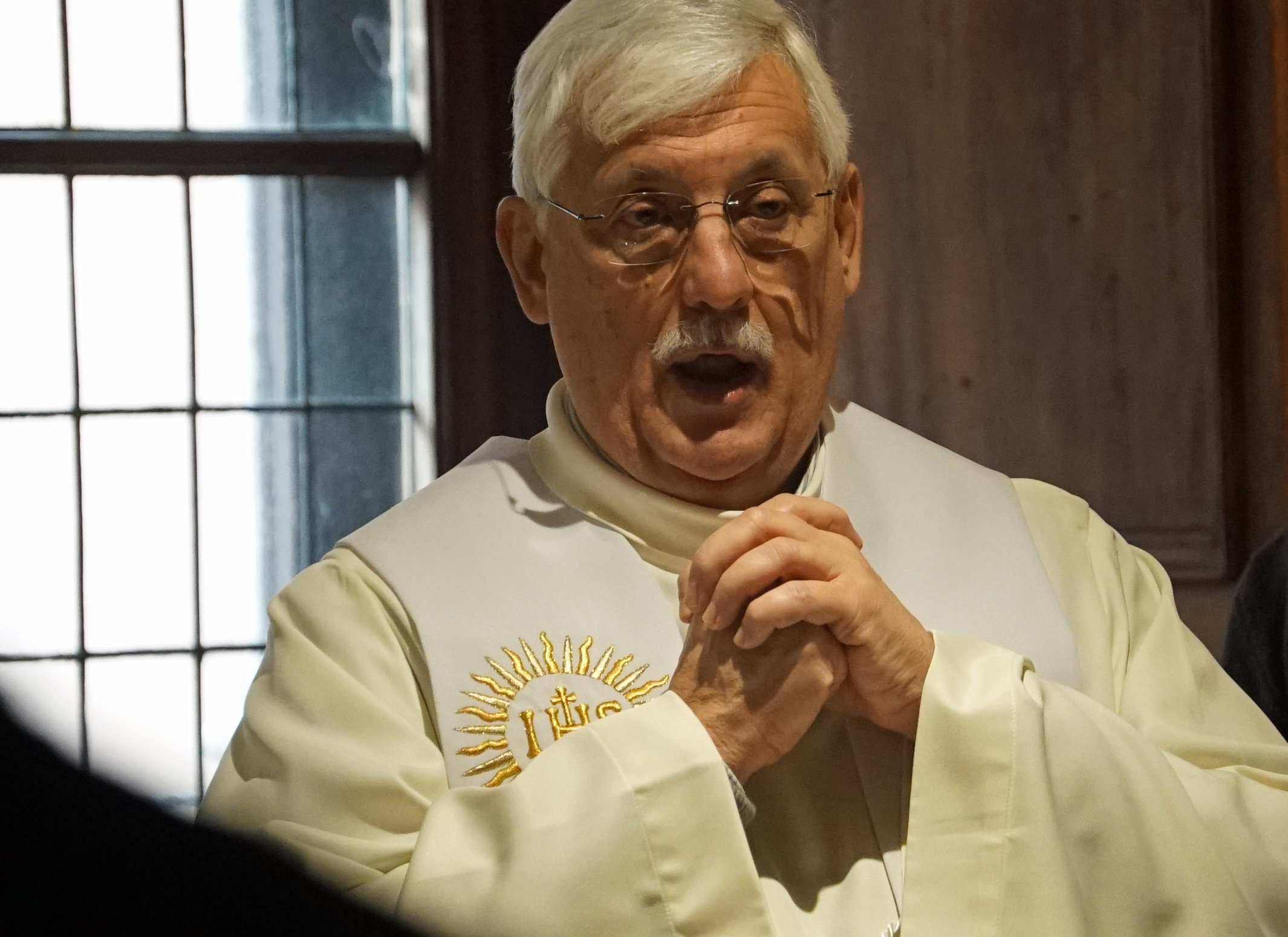Feast of the Baptism of the Lord – Closing of the Meeting of the Enlarged Council
13 January 2019
Homily, by Fr. Arturo Sosa, SJ
The Scripture readings invite us today to contemplate Jesus as he receives the baptism of John. Beginning with his conception in Mary’s womb and his introduction to the traditions by Joseph, Jesus has become deeply incarnated in his people… Luke the evangelist links the genealogy of Jesus to the story of his baptism both to underscore that everyone thought him the son of Joseph(Lk 3,23) and also to remind us of his deep tie to the history of salvation through the chosen people.
With all the people, Jesus goes to Jordan to receive the baptism of water. This is an authentic sign of his desire to be faithful to the mission he received to make himself one like others (Phil 2,6-7). He lives the moment in an attitude of prayer. While he rejoiced in the intimate relationship with God the Father, the heavens were opened and the Holy Spirit descended upon him in bodily form like a dove, and a voice came from heaven: “You are my beloved Son, today I have given you life”(Lk 3,22).
Contemplating this scene, we share the joy of Jesus who is confirmed by the Father and the Holy Spirit. We also share the joy of having experienced for ourselves the active presence of the Holy Spirit in our process of discerning in common the universal apostolic preferences through which the Lord wishes to guide the apostolic body of the Society to a better way of serving in the next ten years. Contemplating this scene impels us to a deeper incarnation among the people in the style of Jesus, poor among the poor. We sense ourselves to be confirmed in the desire to serve as a soldier of God under the banner of the cross in our Society, which we wish to be designated by the name of Jesus, and to serve the Lord alone and the Church, his spouse, under the Roman pontiff, Vicar of Christ on earth” (FI,1).

The scene of the baptism also permits us to contemplate the fascinating figure of John the Baptist. The first image that comes to mind is that of John the collaborator…. It is remarkable that John resists the temptation to pass himself off as the Messiah. Many of those who shared the deep-rooted hope that Yahweh was going to send his Messiah thought they saw in John the fulfillment of that promise.
John, however, shows himself to be man of discernment, one who has chosen deep down to follow the call received from the Lord himself. John is one of those who live in the desert that symbolizes frequent contact with God. John is a man who cultivates familiarity with God as something necessary for his life-mission. Therefore, he knows himself to be a collaborator … He resolves all doubt …I am baptizing you with water, but one mightier than I is coming. I am not worthy to loosen the thongs of his sandals. He will baptize you with the Holy Spirit and fire (Lk 3,16). John knew that he had been sent and that his power came from the one who sent him. John preaches with his life, his actions, and his word the Good News of the reign of God and denounces without fear the misdeeds of those like Herod who believe themselves untouchable and unaccountable. John knows that his fidelity to the mission will have a high cost … but when he first accepted the mission he handed his life over to the Lord.
We are accustomed to calling John the precursor, the one who goes before. It is true that his action began before that of Jesus. He arrived first on the public scene. However, as a collaborator, he does not go before but follows the Lord Jesus whom he recognizes as more powerful than he, before whom he does not feel worthy even to take the sandals from his feet. It is Jesus who gives us the true baptism, who gives the Holy Spirit … and the fire to set the world alight and drive forward the transformation that will bring the world to reconciliation.

It is consoling to see how the profound desire of Ignatius and the first companions to call the Society by the name of Jesus matches the awareness of being and feeling ourselves to be collaborators in the redemptive mission that the Lord wished to continue through his Church. Ignatius and the companions did not want to occupy a notable place but humbly to put themselves entirely at the service of the Church. That is why they insisted on calling themselves the mínima Compañía devoted completely to collaboration in the reconciliation of all things in Christ.
The other two readings remind us and confirm for us the mission with which we have chosen to collaborate with all we are and have. An open mission, as Peter experiences it. Directed to all human beings without distinction because God looks with benevolence on anyone disposed to be reconciled with Him, with brothers and sisters, and with creation.
We have heard many times the cry of the prophet Isaiah… it always encourages the efforts that we make to collaborate in consoling the people of God, coming closer to the poor, to the original peoples, to refugees, to persons who suffer discrimination because of gender, race, religion or way of thought… It encourages us to collaborate in preparing the way of the Lord, so that it reaches also our secular societies and especially young people and those who have never had the opportunity to hear the Good News of their liberation.
With hearts grateful for the experience lived together this week and in recent months in our communities, regions, and provinces, let us ask the Lord that we not rest in our effort to climb to the top of the mountain and cry out at the top of our voice the message of reconciliation, mercy, and hope that we carry.
May Our Lady of the Way, Pedro Arrupe and so many other companions who have gone before us in following the Lord lead us to him and prepare us to receive the baptism of the Holy Spirit and fire.







